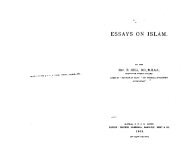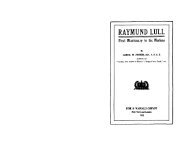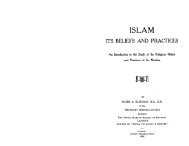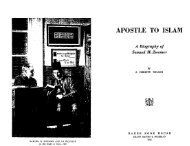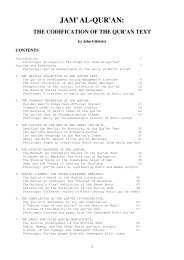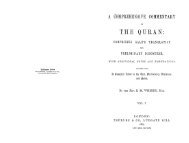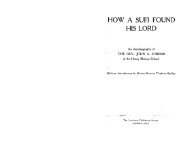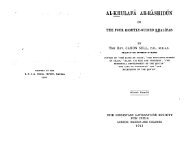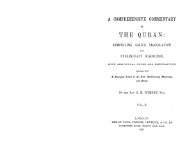Guillaume--Life of Muhammad.pdf - Radical Truth
Guillaume--Life of Muhammad.pdf - Radical Truth
Guillaume--Life of Muhammad.pdf - Radical Truth
Create successful ePaper yourself
Turn your PDF publications into a flip-book with our unique Google optimized e-Paper software.
128 The Lzje <strong>of</strong> <strong>Muhammad</strong><br />
178 name 'the two-tied-together-ones' from this. 'Ali killed him at the baUle<br />
<strong>of</strong> Badr. Abu 'Amr is Qur~a b. 'Abdu 'Amr b. Naufal b. 'Abdu Manaf.<br />
The 'treacherous people' are B. Bakr b. 'Abdu Manat b. Kinana. These<br />
are the Arabs whom Abu Tiilib enumerated in his verse (174)'<br />
When the prophet's fame began to be blazed abroad throughout the land<br />
he was mentioned in Medina. There was no tribe among the Arabs who<br />
knew more about the apostle when and before he was mentioned than this<br />
tribe <strong>of</strong> Aus and Khazraj. The reason for this was that they were well<br />
acquainted with the sayings <strong>of</strong> Jewish rabbis and they lived side by side<br />
with them as allies. When the apostle was talked <strong>of</strong> in Medina and they<br />
heard <strong>of</strong> the trouble he had with Quraysh, Abu Qays b. al-Aslat, brother <strong>of</strong><br />
B. Waqif, composed the verses given below (175).<br />
Abu Qays was warmly attached to Quraysh since he was related to them<br />
through his wife Arnab d. Asad b. 'Abdu'l-'Uzza b. Qu~ayy, and he with<br />
his wife used to stay with them for years at a time. He composed an ode in<br />
which he magnified the sanctity <strong>of</strong> the area, forbade Quraysh to fight there,<br />
urged them to stand by one another, mentioned their merits and virtues,<br />
urged them to protect the apostle, and reminded them <strong>of</strong> how God had<br />
dealt with them and saved them in the War <strong>of</strong> the Elephant.<br />
o rider, when you meet Lu'ayy ibn Ghalib<br />
Give him a message from me,<br />
179 The tidings <strong>of</strong> a man who though far from you<br />
Is distressed at what is between you, sad and worried.<br />
I have become the caravanserai <strong>of</strong> cares,<br />
Because <strong>of</strong> them I cannot do what I should.<br />
I learn that you are divided into camps,<br />
One party kindles the fire <strong>of</strong> war, the other provides the fuel.<br />
I pray God to protect you from your evil act,<br />
Your wicked quarrel and the insidious attack <strong>of</strong> scorpions,<br />
Defamatory reports and secret plots<br />
Like pricking awls which never fail to pierce.<br />
Remind them <strong>of</strong> God, first <strong>of</strong> all things,<br />
And the sin <strong>of</strong> breaking the taboo on travel-worn gazelles. '<br />
Say to them, (and God will give His judgement)<br />
If you abandon war it will go far from you.<br />
When you stir it up you raise an evil thing;<br />
'Tis a monster devouring everything near and far,<br />
It severs kinship and destroys people;<br />
It cuts the flesh from the hump and the back.<br />
You will give up the finest clothes <strong>of</strong> Yaman<br />
For a soldier's garb and coat <strong>of</strong> mail,<br />
Musk and camphor for dust-coloured armour<br />
With buttons like the eyes <strong>of</strong> a locust.<br />
I The killing <strong>of</strong> game within the sacred area was taboo, and the poet means that if the<br />
blood <strong>of</strong> animals there is sacrosanct, afortion bloodshed and war are forbidden by God;<br />
The <strong>Life</strong>"O/ <strong>Muhammad</strong><br />
Beware <strong>of</strong> warI Do not let it cling to you;<br />
A stagnant pool has a bitter draught.<br />
War-it first seems fine to men<br />
But afterwarda they plainly recognize an old hag.<br />
It scorches unsparingly the weak,<br />
And aims death-dealing blows at the great.<br />
Know you not what happened in the war <strong>of</strong> Da~is?<br />
Or the war <strong>of</strong> I:Ialib? Take a lesson from theml<br />
How many a noble chief it slew,<br />
The generous host whose guest lacked naught,<br />
A huge pile <strong>of</strong> ashes beneath his pot,<br />
Praised by all, noble in character, his sword<br />
Drawn only in righteous cause;<br />
'Tis as water poured out at random,<br />
As if winds from all quarters scattered the clouds ;1<br />
A truthful, knowledgeable man will tell you <strong>of</strong> its battles<br />
(For real knowledge is the result <strong>of</strong> experience).<br />
So sell your spears to those who love war<br />
And remember the account you must render, for God IS the best 180<br />
reckoner.<br />
Man's Lord has chosen a rehgion,<br />
So let none guard you but the Lord <strong>of</strong> heaven,<br />
Raise up for us a I;anifi religion.<br />
You are our object; one is guided in travel by heights,<br />
You are a light and protection to this people,<br />
You lead the way, not lacking virtues.<br />
If men were valued, you would be a jewel,<br />
The best <strong>of</strong> the vale is yours in noble pride.<br />
You preserve noble, ancient peoples<br />
Whose genealogy shows no foreign blood;<br />
You see the needy come to your houses<br />
Wave after wave <strong>of</strong> starving wights.<br />
The people know that your leaders<br />
Are ever the best people <strong>of</strong> the stations <strong>of</strong> Mina,'<br />
Best in counsel, l<strong>of</strong>tiest in custom,<br />
Most truthful amid the assemblies.<br />
I If the subject <strong>of</strong> the metaphor is war the reading (jalal is right, and indiscriminate<br />
bloodshed is indicated; if the variant jalal 'porous soil' is adopted, the poet is continuing<br />
his description <strong>of</strong> the generous warrior whose hospitality extends to the most insatiable<br />
guest.<br />
:r. See AI-Suhayli, 182, who says that 1.1. so explains the word. He is quoting from p. 300<br />
<strong>of</strong> the text. AI-Barqi says it was a well at Mina where the blood <strong>of</strong> the sacrificial victims was<br />
collected. It waS a spot venerated by the Arabs. The word jubjuba apparently means the<br />
stomach <strong>of</strong> a ruminant, and naturally a large number <strong>of</strong> such skins used for carrying.water<br />
would be available there; therefore it is possible that the term 'people <strong>of</strong> the stomach skins'<br />
simply means Arabs, the people who more than any other used this kind <strong>of</strong> vessel for carry·<br />
ing food and water, and so the meaning <strong>of</strong> the poet is that the tribe <strong>of</strong> Lu'ayy is the finest<br />
tribe in Arabia.<br />
B 4080<br />
K



